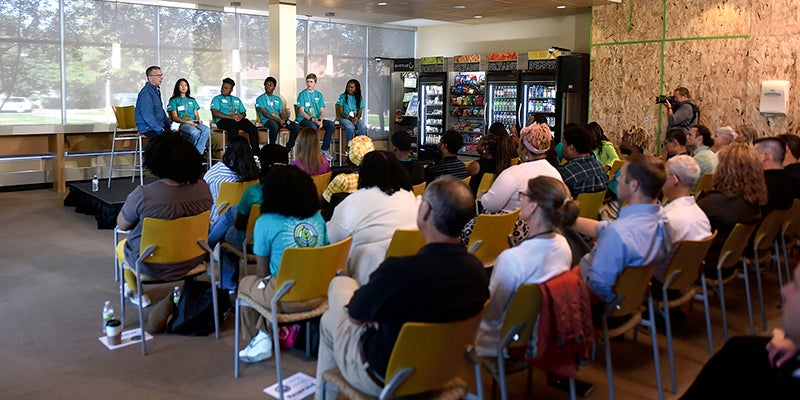Local government tries to buy local when possible
Published 5:01 am Monday, August 4, 2014

Construction progresses on the north Main Street flood mitigation project. While the brunt of the work is being done by Reiner Contracting Inc., out of Hutchinson, Ulland Brothers Incorporated from Austin is also the contractor on the North Main Flood Control. Eric Johnson/photodesk@austindailyherald.com
The Mower County board is seeking contractors to paint the hallways of the Mower County Government Center. The county already has bids from two local businesses and is seeking bids from two more local businesses.
“You’re spending Mower County taxpayers money, so it’s good to keep it circulating in the community,” Commissioner Jerry Reinartz said.
When they can, Mower County, city of Austin and Austin Public Schools officials prefer to spend taxpayer money by awarding projects and services to local companies, but it’s far from a simple process. In many instances, their hands are tied.
“We’re all hoping and cheering for the local vendors, but it does come down to the lowest bid,” Austin City Council Member Steve King said.
Governmental bodies are required to follow state statute when buying goods or services.
 State rules break down buying into three categories: purchases under $25,000, between $25,000 and $100,000, and projects that cost more than $100,000.
State rules break down buying into three categories: purchases under $25,000, between $25,000 and $100,000, and projects that cost more than $100,000.
Officials can go directly to one company to buy goods and services for items under $25,000, though Tom Dankert, Austin’s finance director, said city officials will more often than not bid out certain projects or services. If a city worker needs to spend $100 for fencing, they can technically do so at the nearest hardware store.
“We can just go out on the market and buy something for $5,000,” Dankert said. “But if we decide we want to get a quote from somebody to try to drive that price down, you actually have to attempt to get two of them.”
Officials can go directly to one company to buy goods and services for items under $25,000, though Tom Dankert, Austin’s finance director, said city officials will more often than not bid out certain projects or services. If a city worker needs to spend $100 for fencing, they can technically do so at the nearest hardware store.
“We can just go out on the market and buy something for $5,000,” Dankert said. “But if we decide we want to get a quote from somebody to try to drive that price down, you actually have to attempt to get two of them.”
Councils and boards can either competitively bid a project or seek quotes from companies on purchases between $25,000 and $100,000, though local councils and boards, including the city of Austin, prefer bidding projects out.
Once projects cost more than $100,000, councils and boards have to go through a competitive sealed bid process. Competitive bidding, according to state statute, is meant to ensure taxpayers receive the benefit of the lowest obtainable price from a responsible contractor, provide a level playing field for contractors to compete for city contracts and limit discretion of contract-making officials in situations more susceptible to fraud, favoritism or other abuses.
What’s more, councils and boards are usually bound by the state to take the lowest responsible bid, whether the winning contractor is local or not.
There are only a few instances where councils or boards can decline the lowest bid. Sometimes, a council or board can reject a bid from a company that has a history of shoddy performance. If a contractor has underbid the project, but didn’t fulfill all of the council’s or board’s request, that contractor’s bid can be rejected.
That’s what happened when the Austin City Council rejected a bid to replace a fire truck a few years ago, according to Dankert. Though one of the fire trucks was technically the lowest bid, it didn’t have the right specifications for the Austin Fire Department.
‘We try to buy locally’
Austin Public Schools Superintendent David Krenz said the district tries to purchase from local vendors.
“We try to buy locally whenever we can; it’s just a matter of we’re under state guidelines that we have to take the lowest bid,” Krenz said.
Yet Austin Public Schools has been able to work with local companies for some of its more recent projects.
When the district built I.J. Holton Intermediate School, which opened last September, and when the district renovated Southgate Elementary School and Ellis Middle School this summer, the lowest responsible bids were all from the Joseph Co., a local business.
“We love it,” Finance and Operations Director Mark Stotts said. “That’s a win-win situation for us, where we put it out for bid and our local companies end up being the low bid.”
In many cases the bidding process benefits local businesses and contractors. Local contractors don’t have to worry about extra expenses, and in many cases already have experience with local councils and boards.
“You build up a working relationship with a lot of people,” Austin Mayor Tom Stiehm said.
Out-of-town contractors on road construction projects have to factor travel and hotel expenses when they put together a bid proposal.
“When you bring a crew down here from too far away, you build all that stuff into your bid estimate,” County Coordinator Craig Oscarson said.
That was the case with the $28-million Jail and Justice Center project, when several local companies like Hardy Mechanical and Schammel Electric won construction bids.
Though the Jail and Justice Center Project spurred much debate in the 2000s, John Pristash, the project manager for Rochester’s Knutson Construction Services, called it “a big boost to this region,” noting it put contractors to work during the recession. Seventy-two percent of the construction work went to southeast Minnesota firms — about $12 million — and about 51 percent of the work went to Austin companies — about $8.47 million.
But in other instances, boards have limited options. Almost all county and city road projects exceed $100,000 and require sealed bids, but there aren’t many Mower County contractors to bid on the work. Ulland Brothers Inc., for example, is based out of Cloquet, has an Albert Lea office and bids on many projects.
“They’re a big presence here,” Oscarson said. “To me, they’re a local company.”
Professional services
Councils and boards can hire for professional services without bidding, such as construction manager services, legal services and architectural service.
For the bonds on the jail project, they used a Minneapolis firm because local attorneys don’t specialize in bond issues. Other times they stay local.
When the county remodeled the old jail and courthouse of the Mower County Government Center, a committee recommended an out-of-town architect, but the board instead selected Austin’s Paul Johnson Architects.
The county board also selected Knutson, the construction manager on the Jail and Justice Center, for the same job on the Government Center remodel. Knutson then handled construction bids, similar to the jail process. However, Reinartz criticized the process, saying bond requirements kept some local contractors from bidding, while a design-build model may have included more local businesses.
“There were some areas where we had contractors in Austin that didn’t even bid,” Reinartz said.
A balancing act
Despite trying to stay local, leaders don’t always see a local purchases as the best option. Oscarson noted that officials strive to be responsible stewards of taxpayer money, too.
“It’s a tough decision sometimes,” he said. “When we can, we like to air on the side of the local contractor or local people, but when it’s a taxpayer issue we have to look at that, too.”
The county buys several types of insurance through a statewide association for bulk purchasing for better rates.
The county often buys squad cars for the sheriff’s office at a much lower price through a state purchasing contract, a price local dealerships haven’t matched in the past.
But county officials like to buy local. The county recently bought two new breakroom refrigerators from Donkers Hometown Appliance and only got quotes from Sears and Donkers.
While Commissioner Tony Bennett said spending local is important, he also noted the market today is a global economy, which means most companies do business across the globe. At his embroidery and screen-printing business, Old 218, Bennett tries to reach customers outside the county, so selling product and services in other communities is just part of business, he said. For example, Bennett asked where Hormel Foods Corp. would be if it only did business locally.
Bennett’s chief focus is elsewhere.
”For me it would be trying to find the best deal for the taxpayers’ money,” he said.
Still, the county board often urges staff to buy local if commissioners see bills to out of town companies, Reinartz noted.
A local commitment
The school district purchases local when it comes to landscape maintenance and printing needs, it makes purchases from Games People Play in Austin, and it works with local auditing company CliftonLarsonAllen. The district does a large amount of business with Hy-Vee, and the nails and wood supplied for industrial technology classes are often bought locally.
“We do spend a lot of money locally, we buy at a lot of local retailers for our supplies,” Stotts said.
But not everything that can be bought locally is. Items the school district must buy in large quantities, such as laptops or sports equipment, are usually bought from outside of the area, or directly from manufacturers.
“Balancing for the taxpayers, buying local versus getting the best deal, is kind of a balancing act for us,” Stotts said.
If the district purchased these things locally, it would cost more due to smaller businesses being unable to produce as many items as larger companies. One example is food for school lunches, which is bought in through distributors that can handle the large volume. Both the dairy and bread bids for the 2014-2015 school year were from outside companies due to local companies being unable to provide such a large quantity.
However, the school district will continue making it a priority to buy local. About two years ago, the district added a paragraph to it’s purchasing policy, stating that the district would purchase locally whenever possible. It also encouraged employees to purchase local for their own needs.
“We wanted the public to know that’s what we believe we needed to do,” Krenz said. “Going forward, there’s gonna be a lot of superintendents and a lot of business directors in the future; that way they have some kind of guidelines.”
— Jason Schoonover, Jenae Peterson and Trey Mewes contributed to this article.





